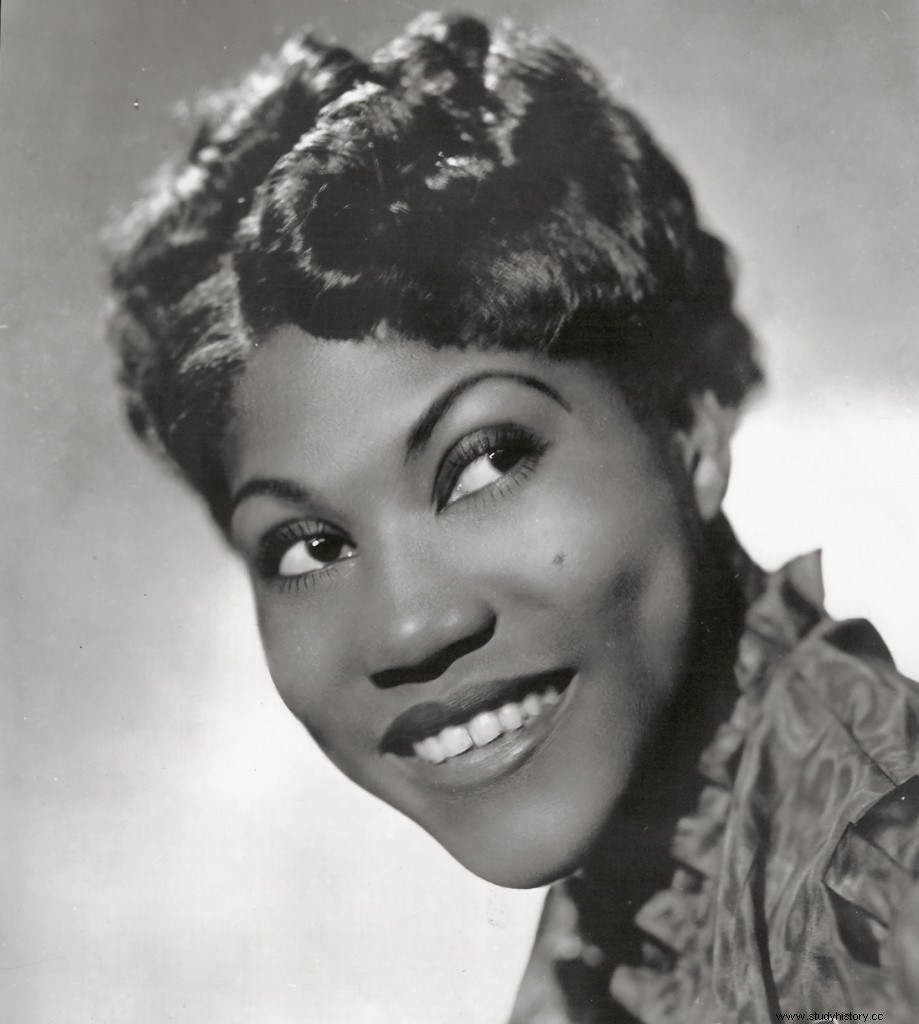Songwriter, singer and innovative gospel and blues musician, Sister Rosetta Tharpe (1915 – 1973) was instrumental in the creation of rock and roll and influenced many artists.
Little Rosetta Nubin

Rosether Atkins was born on March 20, 1915 in Cotton Plant, Arkansas, a state in the southern United States which was then in the midst of racial segregation. Her parents, Katie Bell Nubin and Willis Atkins, work picking cotton. Both are musically inclined:his father, of whom little is known, sings; his mother, especially, sings and plays the mandolin in the Church of God in Christ (COGIC), an evangelical Pentecostal Christian church that encourages the musical expression and preaching of women.
Encouraged by her mother, Rosetta sang and played the guitar from the age of four, under the name of Little Rosetta Nubin. Noted for her talent and her precocity, she was quickly considered a child prodigy of music. At age six, she sang and played guitar in an evangelical troupe touring the southern United States.
In the mid-1920s, Rosetta and her mother moved to Chicago, like many African Americans fleeing racial segregation in the southern states to work in the city's steel mills and slaughterhouses. Both perform at church concerts at COGIC's Roberts Temple, and occasionally on tour. Recognized for her exceptional talent on the guitar, an area in which women are rare and which is considered rather reserved for men - she will often be told to compliment her that she plays "like a man" -, Rosetta becomes more and more more popular.
Rock Me
At nineteen, Rosetta married COGIC pastor Thomas Thorpe, who for a time accompanied mother and daughter on tours. The marriage would last only a few years but, despite her two subsequent marriages, the young woman would keep her name as a stage name, performing under the name of Sister Rosetta Tharpe. In 1938, Katie Bell and her daughter, inseparable, moved to New York…without Thomas. This is where Rosetta's career really took off.
In October 1938, at the age of 23, Rosetta signed a contract with Decca Records and recorded four first titles, accompanied by a jazz orchestra. His tracks, Rock Me, That's All, My Man and I and The Lonesome Road , took off instantly and made Rosetta one of the first gospel artists to achieve commercial success. Rock Me would influence many rock and roll artists, including Elvis Presley. That's All is the first recording where she plays the electric guitar; she is the first gospel performer to use this instrument and this very innovative title will also influence Elvis as well as Chuck Berry.
Rosetta's success does not make it less prone to criticism and controversy. In New York, she discovers that she likes “God and the nightclubs “, will testify his friend Ira Tucker Jr in a documentary. Performing at the Cotton Club in Harlem, she encountered both sides of the coin of success:popularity, as well as hostility from conservatives. The interpretation of gospel in nightclubs with blues or jazz musicians, the mixture of religious lyrics and musical arrangements deemed profane, and the presence of a woman with musical groups, shocked the conservative public and him partially alienate the gospel community. But it is also this explosive mix that has earned him great popularity.
“I’ve been doing that forever”
Sister Rosetta Tharpe frequented the biggest names in jazz of the time, continued her recordings, went on tour in the southern United States despite the restrictions imposed by racial segregation. His song Strange Things Happening Every Day , revealing all his virtuosity as a guitarist, is a precursor to rock and roll, sometimes even considered the first rock recording.
Beginning in 1946, Rosetta performed with fellow gospel performer, Marie Knight. They toured together for several years and recorded songs that became hits, such as Up Above My Head and Gospel Train . Rumors, denied by the two artists, will lend them an affair. From 1949, however, Marie Knight, struck by a personal tragedy, decided to resume her solo career.
In the 1950s, Rosetta's popularity also began to be eclipsed by that of another great gospel singer, Mahalia Jackson. Very talented, the “queen of gospel” is undoubtedly less divisive within the world of gospel while the nascent rock and roll begins to be popularized by mainly white and male artists. She said:“Oh, these kids and rock and roll — this is just sped up rhythm and blues. I've been doing that forever r”. (Oh, those kids and rock and roll – it's just fast-paced rhythm and blues. That's what I've always done). Rosetta's career then began to experience some decline.
End of career
In 1957 and then in the 1960s, Rosetta Tharpe relaunched her career with tours in the United Kingdom and then in Europe, notably in Paris, with blues and gospel artists. Despite declining popularity, his talent continued to earn him recognition from the greatest artists of his time.
In 1968, Rosetta was struck by tragedy when her mother died, this mother who had encouraged her from an early age to get into music, who had supported and then accompanied her throughout her career. In 1970, she suffered a stroke linked to complications from diabetes and lost a leg, but she did not stop working. In October 1973, the day before a recording session in Philadelphia, Rosetta Tharpe died of another stroke.
The innovative and pioneering musical style of rock Rosetta Tharpe, "the godmother of rock", will influence many artists, such as Elvis Presley, Johnny Cash, Little Richard, Aretha Franklin or Tina Turner; Little Richard and Johnny Cash will cite her as their favorite artist. Its decisive role in the birth of rock has been increasingly recognized in recent years. In 2018, she was inducted into the Rock And Roll Hall Of Fame as an early influence.
